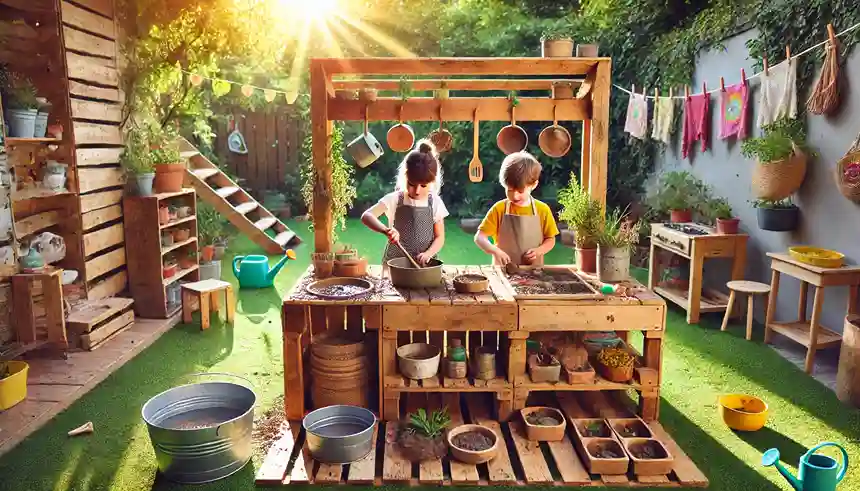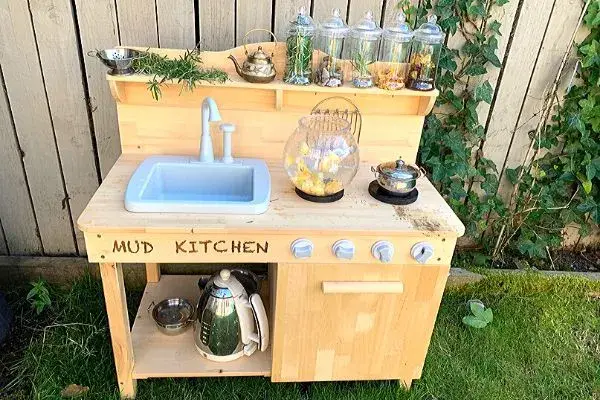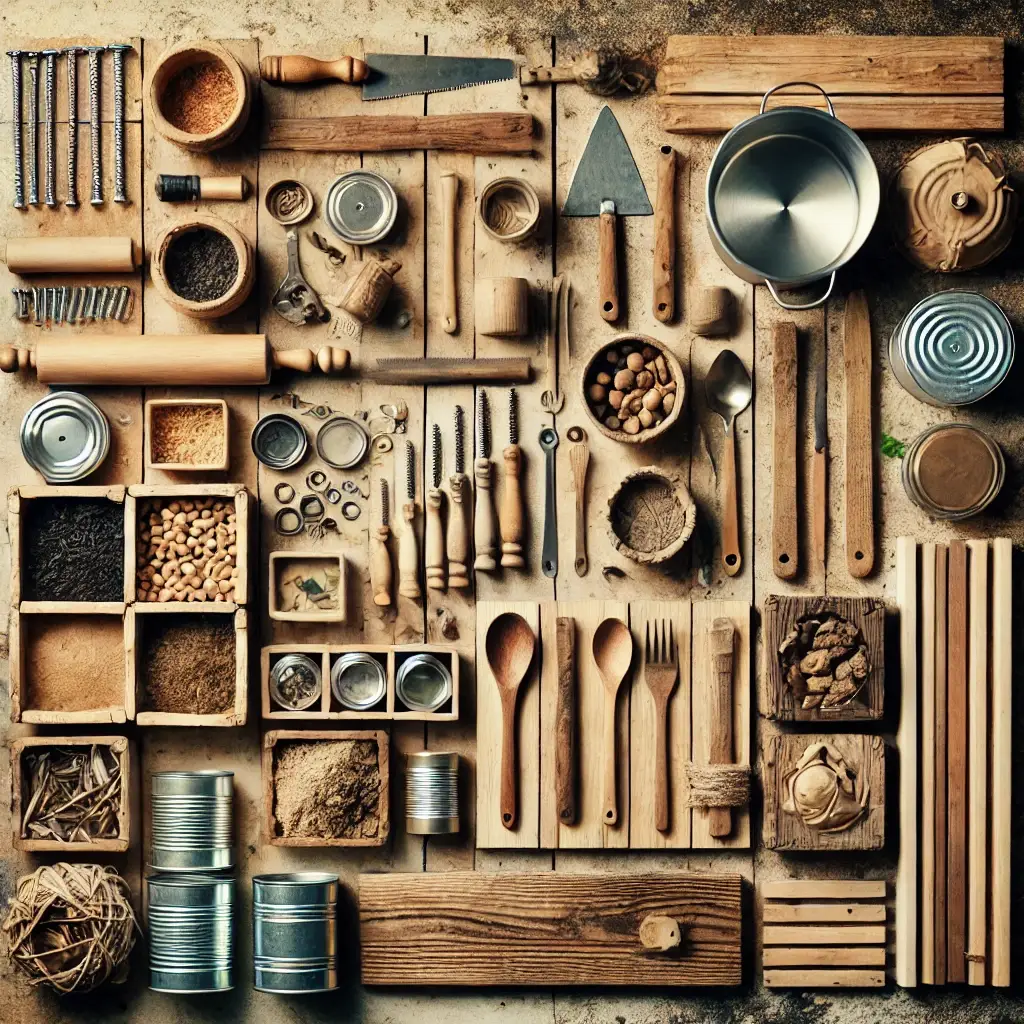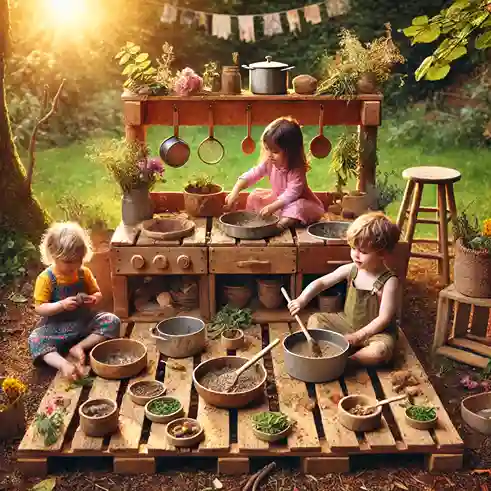Mud kitchen for preschool are more than an outdoor play trend; they can transform into incredibly powerful tools of education, deeply impacting a child’s early development. Many schools, however, have jumped at this chance with both hands, embracing this messy yet meaningful activity, while many more miss out on the different benefits it offers. Here are seven surprising advantages of mud kitchen for preschoolers and let us tell you why many schools haven’t yet jumped on the bandwagon.
Why mud kitchen is Necessary for Preschoolers?
This, in itself, is a critical element of early childhood development, as a mud kitchen for preschoolers offers such depth and variety in learning activities that may not be possible in a regular classroom context. Engaging with tactile activities and sensory play forms a foundational step for preschoolers as they establish the blocks that eventually lead to cognitive, physical, and social development. Mud kitchens stimulate senses. Children touch soft mud, feel cool water, and study natural materials such as leaves, pebbles, and sticks that ought to be utilised to concoct something. Thus, mud kitchens develop preschoolers’ fine and gross motor skills.
However, beyond these physical benefits, the most important advantages lie in their ability to think creatively and contribute to imaginative play. Preschoolers come up with their own “recipes,” pretend that they are chefs, and play real life for the purposes of language and critical thinking development.
Moreover, the role of mud kitchens as social learning spaces cannot be overstated. It encourages teamwork, problem-solving ability, and conflict resolution because it involves sharing of tools, doing joint projects, or discussing ideas. Reconnects children with nature because in an increasingly technological world and indoor activities, the mud kitchen for preschoolers is there to introduce the little ones to environmental responsibilities and a lot more appreciation for nature. This holistic form of play is essential for preschool ages because it gave room for emotional resilience, independence, and confidence. These qualities are what most children need as they venture into the more structured educational worlds.

What is a Mud Kitchen for preschool?
I’d like to give you a little background before the benefits, but what is a mud kitchen? A mud kitchen for Preschool is essentially a play area, commonly outdoors, where children mimic the activities of an actual kitchen but carry this out using mud, water, sand, and other natural elements. Essentially, it’s a DIY structure, such as pallet wood, for a small-scale kitchen with shelves, counters, and sinks where children engage in sensory and imaginative play.
A mud kitchen for Preschool is where kids “cook” by preparing dishes with pies of mud, salads of leaves, stews of flowers, and many more. It incorporates mixed materials using spoons and pots and role-play like real kitchen activities.
Develops Sense Development
One of the greatest advantages of providing a mud kitchen for Preschool is how they enhance sensory development. According to Ursula Kern, author of Re-Modell Your Life. Early childhood is a “sensory” phase of development. “It is during these years that children discover their senses through exploration and play.”.
Touch:
Mud is said to be soft and squishy in texture, cool to the touch. Playing with mud promises a rich tactile experience and enables the child to improve fine motor skills, by scooping, pouring, and mixing together various ingredients, coordination, and strengthening hand muscles which help in writing.
Sight:
They observe how mud gets transformed as it gets mixed with water or some other natural materials. They acquire color, texture and consistency, all of which are crucial elements to cognitive development.
Smell and Taste:
Nowhere in this exploration does it say that they are to put mud into their mouths to taste; so, while they are generally prohibited to taste it, the natural smells of dirt, flowers, and leaves expose them to a mix of natural smells, creating a multi-sensory experience to an appreciation of their surroundings.
Unfortunately, most preschools are still reluctant to introduce mud kitchen for Preschool in their facilities because they fear that these kitchens might cause enormous mess and dirtiness, issues that short-change the long-term benefits in developmental cases.
It Encourages Social and Emotional Development
Mud kitchen for Preschool are one of the fantastic opportunities for children to engage in cooperative play, which is an important factor for developing social skills at a young age. When playing in a mud kitchen, especially when there are several children, they will learn to share tools, cooperate on recipes, and be willing to take turns, thereby developing means of communication and teamwork.
Moreover, mud kitchen for Preschool help preschoolers develop emotional hardiness. In the process of making something for their own hands by constructing a mud pie, they feel a sense of accomplishment and self-confidence. Furthermore, the non-structured nature of mud play encourages independence and confidence because children must make individual decisions to solve problems.
Co-operative Play:
There is negotiation of roles, who is the “chef,” and who is going to get which ingredients whereby social skills are taught.
Emotional Expression: Mud kitchen for Preschool are less noisy environments where children are allowed to exhibit emotions. The sensory natures of playing mud are even more soothing to the children, who usually are unable to voice their thoughts.
Encourages Creativity and Imagination
Mud kitchen for Preschool trigger creativity in preschoolers. This activity, by nature, unfolds the sublimity to children who can therefore run their imaginations wild. They can pretend to be chefs, bakers, or restaurant owners, designing many dishes using natural materials around them.
Role Play:
Pretend play is very important for early childhood development. In a mud kitchen for Preschool, children should role-play various real-life situations from cooking meals to cleaning up afterward. This type of imaginative play helps them develop their language as well as critical thinking.
Exploring the Natural World:
A mud kitchen for Preschool does encourage children to be exploratory as they search for loads of ingredients such as leaves, flowers, and stones. These make not only for an increased contact with nature but also increased love and appreciation from children for their world.
Many preschools avoid mud kitchen for Preschool because they fear the activity might get messy. However, in putting regulations in place and having a designated outdoor area, mess is easily managed, which allows creativity to blossom in an environment without much fuss.
Encourages Physical Development
Mud kitchens are helpful not only mentally and emotionally but also in physical activities. Activities like mixing, pouring, stirring, and lifting with a mud kitchen for Preschool develop both gross and fine motor skills.
Gross Motor Skills: Carrying heavy buckets of mud or water helps children build strength and keep their balance. Such large movements help the individual achieve perfect coordination, endurance, and overall well-rounded physical development.
Fine Motor Skills: Scooping, measuring, and stirring are complex actions that exercise the child’s hand-eye coordination and dexterity. These are precursors to writing and drawing.
Preschools that neglect the creation of a mud kitchen for preschool may not recognize this seemingly simple activity as facilitating the entire spectrum of motor development in early childhood.

Teaches Basic Math and Science Concepts
Another not-so-well-known aspect of mud kitchen for Preschool is the potential to teach the child some simple math and scientific skills. They measure things, count things, and sometimes even demonstrate cause and effect.
Math Skills: When children scoop mud into a bowl or fill a cup with water, they come to understand some of the concepts behind volume, measurement, and proportions. Counting spoonfuls of mud or dividing leaves among “dishes” brings into practical use some very early math skills without there having been any “lesson.”.
Science Skills:
Mud Kitchen for Preschool are an excellent introductory point for teaching even the early science concepts, such as states of matter. Children can see how water turns dirt into mud, how plants break down over time, or how wet mud can simply dry up under the sun’s heating. These observations open the door to piquing their curiosity and scientific mindset.
Unfortunately, most schools neglect these natural learning opportunities and instead prefer traditional indoor lessons that may not capture the imagination of their students in the same way.
- Inspired by Awareness for Environment and Human Connection to Nature
Mud kitchen for Preschool have provided a great opportunity in an age where children spend much of their time indoors and on screens to connect with nature as the preschooler will be necessitated by playing in the mud kitchen for Preschool to interact with natural material like dirt, water, stones, and leaves, thus creating an appreciation for the environment from a young age.
Environmental Stewardship:
The mud kitchen teaches a child where the material is coming from and how it relates to nature. Children develop respect and responsibility for their environment, potentially leading to life-long environmental stewardship.
Relationships with Nature: Time spent in nature reduces stress and allows wholesome growth of children. The environmental surroundings about children have successfully focused attention as well as enhanced emotional skills. Hence it is more integral a part of the preschool stage.
Though these are crucial to the developmental process, most of the schools hesitate to present the opportunities for outdoor playtime owing to their safety and cleanliness issues, which in turn deprives them of opportunities to take care of nature.
Builds Resilience and Problem Solving Ability
A mud kitchen for Preschool is a safe space for the children to try things out, make mistakes, and learn from them. Whether it is in the amount of water to add to their mud mixture or in figuring out how to divide their materials to multiple “dishes,” there is constant problem solving.
One such place where the child learns from trial and errors is a mud kitchen. If the shape of the mud pie does not turn out proper, they try again and again, developing the ability to persist more and build up resilience. It is how they will come to understand that mistakes are actually a part of learning, an important lesson for education in the future.
Critical Thinking:
When children combine materials or create their own recipes, they must solve what to do in order to get what they want. That kind of problem-solving skill is important for later on in school life.
The sad thing is that most preschools avoid mud kitchens for it lacks the structured elements, which also becomes the same reason that makes them ideal for children’s meaningful problem-solving and critical thinking.

Why Do Most Preschools Disregard Mud Kitchens?
Indeed, though mud kitchen for Preschool offer a lot of benefits, most preschools have not taken this concept seriously. In summary, three common reasons have emerged to date:
Fear of Mess.
Most educators as well as parents fear mud kitchen for Preschool because of the possible mess associated with this activity. However, proper planning and outdoor play areas can manage some level of mess for developmental benefits.
Hygiene and safety:
some preschools are concerned with health among the younger children. It comes as a clear boundary for hand washing and hygiene.
Unawareness: Many of the educators do not know of all the benefits mud kitchen for Preschool can offer them. Once they learn about developmental and other advantages they may be more likely to take them on board in their curriculum.
Cost and Space: Some preschools may consider that putting up a mud kitchen might be too expensive or space-consuming. In fact, mud kitchens can be simple and inexpensive to put together from basic recycled materials in a very small outdoor area.
Conclusion
Mud kitchens offer preschoolers a wide range of benefits that begin with stimulation of sensory and social development. They encourage creativity while stimulating a child’s body and the environment. Though most preschools have not adopted mud kitchens due to worries about mess, safety, or cost, all these can be easily overcome with a little planning.
Mud kitchens bring early childhood education closer to being inclusive and rich as they allow every aspect of a child’s development to grow-full of sensory and imaginative experiences. More and more preschools need to tap the power of mud and give more opportunities for children to learn from nature-based play.
Mud Kitchens FAQs for Preschoolers
What is a mud kitchen for a preschooler?
Mud kitchen is an outdoor play area where children explore sensory and imaginative play using natural materials such as mud, water, leaves, and stones. A typical arrangement for a mud kitchen usually consists of a basic kitchen setting with counters, shelves, pots, pans, and utensils that enable children to simulate real-life activities in the kitchen while playing outside in nature.
What are some of the advantages of preschoolers engaged with a mud kitchen?
Some of the benefits of mud kitchens include:
Development of sensory skills-touch, vision, sense of smell
Development of social skills-share/ take turns during play
Creative thinking and role-playing
Supports physical development-gross and fine motor skills
Development of basic math and science concepts-measuring, states of matter
Environmental awareness and connection to nature
Development of problem-solving skills, resiliency
- Is it safe for preschoolers to have mud kitchens?
Mud kitchens are safe in general if a few precautions are used. Always make children wash their hands after playing with the mud and other natural materials. Keep an eye on children’s play so that the materials cannot be ingested accidentally. Use tools that are non-toxic and are child-safe, ensuring that the safety rules are clearly communicated so as to avoid messy play and unsafe behavior.
- Are mud kitchens useful for early learning?
Absolutely! Exploring math and science is just so much fun in mud kitchens, learning problem-solving skills along the way. Measuring mud, counting spoonfuls, observing how the products change when mixed together … all things preschoolers learn in learning math and science by doing and exploring.
- What materials are needed for a mud kitchen build?
For a simple mud kitchen, you can have:
Wooden planks or pallets for the frame and counter
Nails, screws and tools like hammer or drill
Pots, pans, spoons and any other items in the kitchen
A basin or bucket for water
Hooks and shelves Many mud kitchens can be made from reusable materials so making it easy and an affordable DIY project.
- Why don’t some schools accept the use of mud kitchens?
Some schools avoid them because of mess, hygiene, and safety issues; however, proper planning could work off those problems. Messy play could be designated for a section of outdoor play areas, and hand-washing and tool-use guidelines will manage to ensure a safe and enjoyable experience for all children.
- Will a mud kitchen be available throughout the year?
Mud kitchens can be played with throughout the year, depending on some weather conditions. Sand, water, and other natural materials will be played with during the colder months. Safe outdoor play is possible in winter if weather-appropriate clothing is provided and children are not allowed to play outside in extreme conditions.
- How do I encourage my child to play in a mud kitchen?
For encouragement to mud kitchen play, you can:
Present imaginative role play scenarios (e.g. “Let’s make a mud pie!”)
Provide many natural materials to mix together (leaves, flowers, stones)
Join in by ordering a meal, or asking your child to “make something” for you
Let’s allow children to have free play or unstructured play where they are free to explore and create what they want without any set rules.

